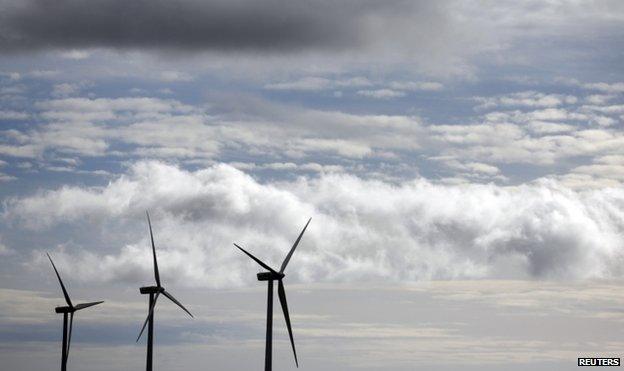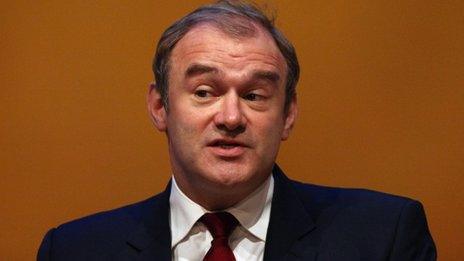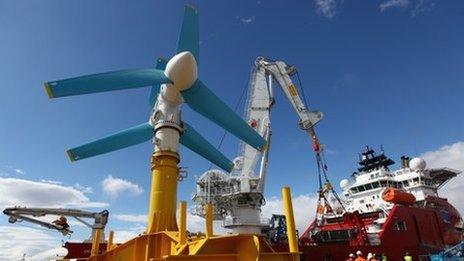Scottish independence: 'Yes' vote could hit energy sector, says UK government
- Published

The UK government said Scotland got 28% of subsidies for renewables while the nation accounted for 10% of electricity sales
An independent Scotland could expect to lose subsidies to green energy investment from the rest of the UK, the UK government has warned.
It estimates the average Scottish bill would rise by between £38 and £189 per year, if Scots are to sustain the current plans for renewable power.
The paper added that a "continuing UK would not be obliged to purchase energy from an independent Scottish state."
The Scottish government said the paper was "yet more scaremongering".
Fergus Ewing: "Prices will rise because the UK has failed in its primary objective."
Earlier this week, the Scottish government set out its argument that the rest of the UK would rely on imports to meet its green power obligations.
However, this is disputed in a paper on energy produced by the Department for Energy and Climate Change, which is being published as UK Energy Secretary Ed Davey visits Edinburgh.
It says: "The decision to import energy from an independent Scottish state would be taken on a commercial basis and in the national interest of the continuing UK."
Ed Davey: "Britain's single energy market makes our energy more secure, it keeps costs down."
It counters claims from the SNP administration that both countries would wish to operate a shared all-Britain energy market.
Mr Davey told BBC Radio Scotland's Good Morning Scotland programme: "I think Britain's single energy market - where we are integrated as we are now, where energy flows across the border very easily - that makes our energy more secure, it keeps costs down and it will enable us to go green, to go low carbon. Split that up and all those benefits go."
The minister added: "As secretary of state for energy and climate change for the whole of the UK, I really care about what is happening in Scotland. If I am no longer secretary of state for energy in Scotland I have to put the interests of consumers in England and Wales and Northern Ireland first."
His point was made clear in the Whitehall document which said a common approach "would be very difficult when both would want to make decisions in the best interests of their citizens and consumers".
It adds: "With a range of generation sources within its own borders and elsewhere, a continuing UK would not be obliged to purchase energy from an independent Scottish state."
The Westminster government paper, being published ahead of the 18 September independence referendum, says the UK is ranked second in the world for energy security.
However, the Scottish government argues that Scotland is Europe's most energy-rich nation, due to oil, gas, hydro, offshore wind, wave and tidal resources, and that the UK government has failed to ensure security of supply because of its policy delays.
Scotland's Energy Minister Fergus Ewing said the UK government paper was evidence of "yet more scaremongering".
He said ministers at Westminster would do better to maintain an amicable approach with Scotland.
Mr Ewing said he had not seen the energy document but his guess was that it would be misleading.
He believed it would not include costs of a new nuclear power station at Hinkley Point nor the decommissioning costs associated with Sellafield.
Mr Ewing told BBC Radio's Good Morning Scotland programme: "There is not sufficient capacity to ensure that we can keep the lights on without emergency measures such as asking businesses to shut down and bringing back mothballed plants into operation at much higher costs.
"The net upshot of all of this is that prices will rise because the UK has failed in its primary objective of securing sufficient indigenous electricity supply."

The report by the Department of Energy and Climate Change coincides with a visit to Edinburgh by UK Energy Secretary Ed Davey
However, UK Energy Secretary Mr Davey insisted that "all costs" had been taken into account. He added that what Mr Ewing had overlooked was that nuclear power was far cheaper than renewable energy, like offshore wind, is currently.
'Little difference'
A report published last month by Exane BNP Paribas is being highlighted by the SNP, saying political risk associated with UK energy policy has risen steeply in the past year.
With uncertainty about subsidy levels and the Labour leadership promising a temporary freeze on bills, the industry report says that the UK is now perceived as the country with the greatest political risk in the European energy sector.
The Whitehall analysis says that, in the event of a referendum "Yes" vote, the loss of responsibility for meeting Scottish demand for electricity would mean it would make little difference to the security of supply for the rest of the UK.

The Scottish government says Scotland has massive oil, gas, hydro, offshore wind, wave and tidal resources
It goes on to claim that Scotland gets a disproportionately high share of support for green energy, receiving 28% of subsidies for renewables in 2012-13 while the country accounts for 10% of UK electricity sales.
It says Scottish grid improvements have taken nearly 30% of investment earmarked for the British grid between 2013 and 2021.
The paper claimed that remoter Scottish communities could not count, post-independence, on a subsidy for remote households which is backed by bill-payers across Britain, or on continued support for gas supply in some towns off the grid system.
Although the UK government has been criticised for the apparent lack of effective competition in the energy supply market, DECC argues that a smaller Scottish market could face less competition, and lose the "downward pressure on energy prices".
New member
There is also a warning that the obligations on Scotland to generate a share of its power from renewable sources is uncertain under independence, and could be raised as a result of negotiations on joining the European Union as a new member state.
On oil and gas, the paper says an independent Scotland would have to provide support of ten times as much as the UK - about £3,800 per head - to match the £20bn the UK government has committed towards decommissioning of North Sea equipment.
Scottish ministers hail Aberdeen as "Europe's oil and gas capital", while saying Glasgow was now the leading research centre in Europe for offshore wind technology. They say independence would allow Scotland to build on that success.
Scotland could expect to lose subsidies to green energy investment from the rest of the UK if the nation becomes independent, the UK government has warned.